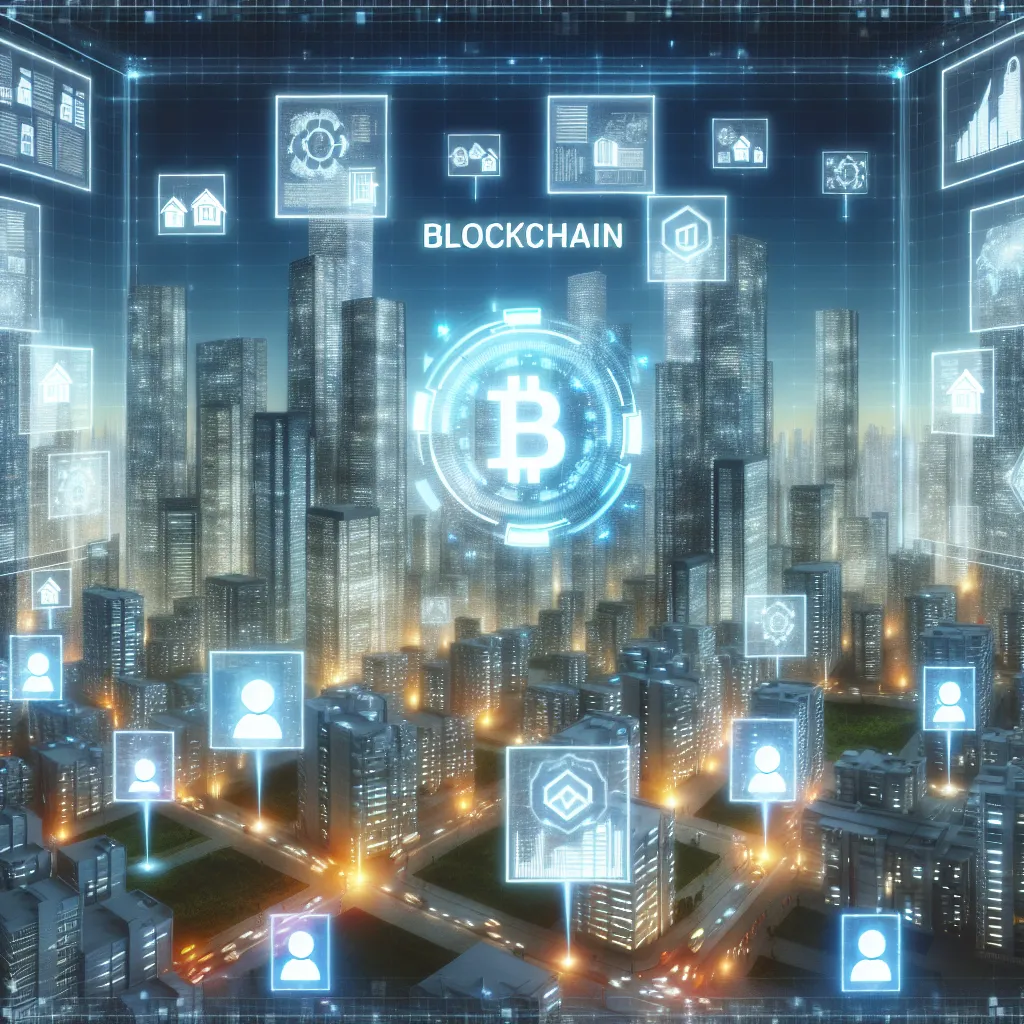As an experienced IELTS instructor, I’m excited to share with you a practice reading test focused on the innovative topic of blockchain technology in real estate. This test will not only enhance your reading skills but also provide valuable insights into a cutting-edge industry trend. Let’s dive into the world of blockchain and real estate!
Nội dung bài viết
- Introduction to the IELTS Reading Test
- Reading Passages and Questions
- Passage 1 (Easy Text): The Basics of Blockchain in Real Estate
- Passage 2 (Medium Text): Transforming Property Transactions and Management
- Passage 3 (Hard Text): The Future Landscape of Blockchain-Enabled Real Estate
- Answer Key
- Passage 1 (Easy Text)
- Passage 2 (Medium Text)
- Passage 3 (Hard Text)
- Conclusion
 Blockchain technology in real estate
Blockchain technology in real estate
Introduction to the IELTS Reading Test
The IELTS Reading test consists of three passages of increasing difficulty, designed to assess your reading comprehension skills. Today’s practice test revolves around the theme “How blockchain is reshaping the real estate industry.” This topic is not only relevant for the IELTS exam but also provides valuable knowledge about technological advancements in a major economic sector.
Reading Passages and Questions
Passage 1 (Easy Text): The Basics of Blockchain in Real Estate
Blockchain technology, originally developed for cryptocurrencies like Bitcoin, is now making waves in various industries, including real estate. This decentralized ledger system offers a new way to record, store, and transfer data securely. In the real estate sector, blockchain has the potential to revolutionize how property transactions are conducted, managed, and recorded.
One of the primary benefits of blockchain in real estate is increased transparency. Every transaction is recorded on a public ledger, making it nearly impossible to alter or falsify information. This level of transparency can significantly reduce fraud and disputes in property dealings. Additionally, blockchain can streamline the process of property transfers by eliminating the need for intermediaries, potentially saving time and reducing costs for both buyers and sellers.
Another exciting application of blockchain in real estate is the concept of “smart contracts.” These are self-executing contracts with the terms of the agreement directly written into code. When predefined conditions are met, the contract automatically executes. For example, in a property sale, once the buyer transfers the funds, the ownership could be automatically transferred without the need for manual intervention.
Questions 1-5: Identifying Information (True/False/Not Given)
For each statement, write
TRUE if the statement agrees with the information in the passage
FALSE if the statement contradicts the information in the passage
NOT GIVEN if there is no information about the statement in the passage
- Blockchain technology was initially created for the real estate industry.
- The use of blockchain in real estate can help reduce fraudulent activities.
- Smart contracts require manual execution once conditions are met.
- Blockchain technology eliminates the need for all third parties in real estate transactions.
- The implementation of blockchain in real estate is already widespread globally.
Passage 2 (Medium Text): Transforming Property Transactions and Management
The integration of blockchain technology into the real estate industry is poised to transform various aspects of property transactions and management. One of the most significant impacts is on the process of due diligence. Traditionally, this process involves extensive research and verification of property details, ownership history, and legal status – a time-consuming and often costly endeavor. Blockchain can potentially streamline this process by providing a secure, immutable record of all property-related information.
Another area where blockchain is making inroads is in property registration and title management. Many countries still rely on paper-based systems for property records, which can be susceptible to loss, damage, or fraudulent alterations. By digitizing these records and storing them on a blockchain, governments and property owners can ensure a tamper-proof and easily accessible system of land registry. This not only enhances security but also significantly reduces the time and cost associated with property searches and title transfers.
Blockchain technology is also enabling new forms of property ownership and investment. Through tokenization, real estate assets can be divided into smaller, more affordable units, allowing for fractional ownership. This democratizes access to real estate investment, enabling individuals to invest in high-value properties that would otherwise be out of reach. Moreover, these tokens can be easily traded on secondary markets, potentially increasing liquidity in the real estate market.
The rental market is another sector benefiting from blockchain innovation. Smart contracts can automate many aspects of the landlord-tenant relationship, from rent collection to maintenance requests. This can lead to more efficient property management and reduce disputes between parties. Additionally, blockchain-based reputation systems could provide more reliable tenant and landlord ratings, fostering trust in the rental ecosystem.
Questions 6-10: Matching Headings
Match the following headings to the paragraphs in Passage 2. Write the correct heading number (i-viii) next to the paragraph number.
Paragraph 1: __
Paragraph 2: __
Paragraph 3: __
Paragraph 4: __
i. Revolutionizing property registration systems
ii. The future of blockchain in commercial real estate
iii. Enhancing the due diligence process through blockchain
iv. Blockchain’s impact on property valuation
v. Democratizing real estate investment through tokenization
vi. Improving efficiency in the rental market
vii. Challenges in implementing blockchain in real estate
viii. Blockchain and sustainable real estate development
Passage 3 (Hard Text): The Future Landscape of Blockchain-Enabled Real Estate
The confluence of blockchain technology and real estate is catalyzing a paradigm shift in how we conceptualize property ownership, transaction processes, and market dynamics. This technological revolution is not merely an incremental improvement but a fundamental reimagining of the real estate ecosystem. As we stand on the cusp of this transformation, it is crucial to examine the potential long-term implications and challenges that lie ahead.
One of the most profound impacts of blockchain on real estate is the potential for global property markets to become more interconnected and accessible. The technology’s ability to provide secure, transparent, and near-instantaneous transactions could effectively dissolve geographical barriers that have traditionally segmented real estate markets. This could lead to a more globalized property market, where investors from any part of the world can easily and confidently participate in transactions across borders.
However, this globalization of real estate through blockchain is not without its challenges. Regulatory frameworks vary significantly across jurisdictions, and the borderless nature of blockchain transactions may create complex legal and compliance issues. Governments and international bodies will need to collaborate to establish coherent regulatory standards that can accommodate this new paradigm while still protecting the interests of all parties involved.
The tokenization of real estate assets on blockchain platforms presents another frontier of innovation. Beyond simply facilitating fractional ownership, this approach could fundamentally alter how we value and trade properties. Real estate tokens could potentially be traded as fluidly as stocks, creating a hybrid asset class that combines the stability of physical property with the liquidity of financial instruments. This could lead to the emergence of new financial products and investment strategies, blurring the lines between real estate and other asset classes.
Moreover, the integration of blockchain with other emerging technologies such as artificial intelligence (AI) and the Internet of Things (IoT) could create synergies that further revolutionize the real estate industry. For instance, AI algorithms could analyze blockchain data to provide more accurate and dynamic property valuations, while IoT devices could feed real-time data about a property’s condition and usage directly into the blockchain, enhancing transparency and informing smart contract executions.
As we look to the future, the potential of blockchain in real estate extends beyond mere transactional efficiencies. It has the capacity to reshape urban planning and development. Smart cities could leverage blockchain to create more transparent and efficient systems for land use, zoning, and property development. This could lead to more sustainable and responsive urban environments, where the use and development of real estate are optimized in real-time based on the changing needs of the community.
In conclusion, while the full realization of blockchain’s potential in real estate may still be on the horizon, the groundwork for this transformation is being laid today. As the technology matures and adoption increases, we can expect to see a real estate landscape that is more transparent, efficient, and accessible than ever before. However, this journey will require careful navigation of technical, regulatory, and social challenges to ensure that the benefits of this revolution are equitably distributed and sustainably implemented.
Questions 11-14: Multiple Choice
Choose the correct letter, A, B, C, or D.
-
According to the passage, what is one of the main impacts of blockchain on real estate markets?
A) It will eliminate all forms of property fraud
B) It will make real estate markets more interconnected globally
C) It will completely replace traditional real estate agents
D) It will only benefit large-scale property developers -
What challenge does the passage highlight regarding the globalization of real estate through blockchain?
A) The high cost of implementing blockchain technology
B) The lack of interest from international investors
C) The complexity of varying regulatory frameworks across jurisdictions
D) The inability of blockchain to handle large-scale property transactions -
How does the passage suggest tokenization could change property trading?
A) By making all properties equally valuable
B) By eliminating the need for physical properties
C) By potentially allowing real estate to be traded as fluidly as stocks
D) By restricting property ownership to token holders only -
What potential synergy between blockchain and other technologies does the passage mention?
A) Blockchain and virtual reality for property viewings
B) Blockchain and AI for more accurate property valuations
C) Blockchain and 5G networks for faster transactions
D) Blockchain and robotics for automated property maintenance
Questions 15-20: Summary Completion
Complete the summary below using words from the reading passage. Write NO MORE THAN TWO WORDS for each answer.
Blockchain technology is set to revolutionize the real estate industry in numerous ways. It has the potential to create a more (15)__ and accessible global property market. However, this also presents challenges related to (16)__ across different jurisdictions. The (17)__ of real estate assets could lead to a new hybrid asset class, combining property stability with financial instrument liquidity. Integration with technologies like AI and IoT could further enhance the industry, providing more accurate (18)__ and real-time data on properties. In urban development, blockchain could contribute to the creation of (19)__, optimizing land use and property development. While the full potential of blockchain in real estate is yet to be realized, it promises a future where the industry is more (20)__, efficient, and accessible.
Answer Key
Passage 1 (Easy Text)
- FALSE
- TRUE
- FALSE
- NOT GIVEN
- NOT GIVEN
Passage 2 (Medium Text)
- iii
- i
- v
- vi
Passage 3 (Hard Text)
- B
- C
- C
- B
- interconnected
- regulatory frameworks
- tokenization
- property valuations
- smart cities
- transparent
Conclusion
This practice test has explored the fascinating intersection of blockchain technology and the real estate industry. By engaging with this material, you’ve not only honed your IELTS reading skills but also gained valuable insights into a cutting-edge topic. Remember, success in the IELTS reading section comes from regular practice and exposure to a wide range of subjects.
For more practice on technology-related topics, you might find our article on how blockchain technology is changing the financial industry helpful. Additionally, to broaden your understanding of digital innovations in finance, check out our piece on how fintech is reshaping the global financial landscape.
Keep practicing, stay curious about emerging trends, and you’ll be well-prepared for success in your IELTS exam!


